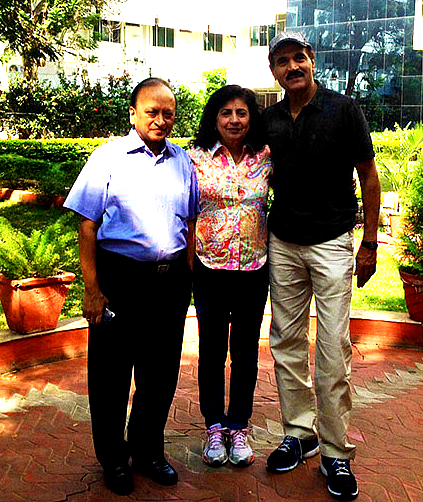
Doctor Ramini and Doctor and Mrs. Mirani
Imagine going blind. The darkness creeps in slowly, over the course of a few years. Cataracts build over the lens of the eye, and your vision, once perfectly clear, becomes blurry, then murky, then completely dark. In an instant, color, light and the faces of the ones you love are gone forever.
It’s hard to fathom.
What’s harder to believe is that of the 37 million people who are blind across the globe, 15 million live in India. A country with a high population, pervasive poverty and less-than-adequate access to medical care, India is also home to Dr. Haresh Mirani, a medical doctor now based in Knoxville, Tennessee. Last year, after doing some research, Dr. Mirani was shocked to find that every fourth blind person lives in India.
“It is the blindest nation in the world,” he says, “which is unfortunate because I am from India.”
Dr. Mirani was born in Mumbai, the oldest of three children. His father was a clerk for an oil company, the kind of man who woke every morning at 4, worked diligently all day and encouraged his son to attend medical school, despite their humble means.
“It takes a special kind of father to be called Daddy,” Dr. Mirani says. “But that’s what I called him. It’s what I still call him.”
Both of Dr. Mirani’s parents passed away when he was young. At 24, having already lost his mother, Dr. Mirani learned that his father had passed away in his sleep. The news crushed him, but holding onto the encouragement his father had given him, he found a way to finish medical school, get married, take care of his two younger siblings and migrate to the United States, where he joined the American Medical Association.
Now, at 62, Dr. Mirani recognizes that for many years, his life was focused solely on professional success. At the height of his career, he managed multiple medical practices and was succeeding
financially, but something still felt like it was missing. Though he didn’t know it then, Dr. Mirani couldn’t see beyond his own circumstances—in a way, he, too, was blind.
All that changed three years ago, when a bumper sticker caught his attention.
“WWJD,” Dr. Mirani remembers. “I knew what it meant, but I’m a Hindu by faith, so it didn’t speak to me as much as it would someone who is a Christian. But it intrigued me. And so I made
my own mantra. WWDD. What Would Daddy Do? What would he have done if he’d had the means?”
WWDD? This simple question sent Dr. Mirani on a three-year search for a place to give his wealth away. A natural researcher, Dr. Mirani set about doing his due diligence; he scoured Charity Navigator and even set up a donor-advised fund (DAF) account to facilitate his giving. But nothing struck him right away.
“Giving your money away is not a part of the medical school curriculum, obviously,” he laughs. “It was like going to school all over again.”
Eventually, he came across the Sankara Eye Foundation (SEF), a nonprofit founded in 1978 to restore sight to India’s blind. While researching, Dr. Mirani discovered that many people in India
suffer from cataracts, a condition that, left untreated, can lead to blindness. A cataract surgery typically lasts only 30 minutes. To go blind because of cataracts would be “unthinkable for the
average American,” he says.
Intrigued by SEF and motivated by his new mantra, Dr. Mirani traveled to India to see the organization’s work in action. At a hospital in Coimbatore, he was amazed to find facilities with room for 350 patients. The center had excellent pre- and post-operative suites. And since many patients were without transportation, SEF sent buses 30 to 50 kilometers outside of the city to pick up patients who lived in rural areas. During their stay at the hospital, patients received vital eye surgeries, housing, food and rehabilitation. And once they were on their way to recovery, SEF transported them home. With a global network of donors, SEF provides all of this at no cost to the patient.
“But what blew my mind the most was seeing a patient who had been blind see for the first time,” he says. “Just imagine a 70-year-old man who develops cataracts. Otherwise, he is very healthy, but all of the sudden he can’t see. He can’t get around. He’s dependent on the rest of his family to feed him and take care of him. He’s confined to a small house. And now, after this minor surgery, they remove the bandages, and he’s able to see! He can see his grandchildren for the first time in two or three years! Every patient that I saw in the recovery room was filled with emotion. There were always tears.”
For Dr. Mirani, the decision was simple. This was where he was meant to put his money to work. In October 2014, Dr. Mirani decided to do something radical—and he is still doing it. Every day,
he pays to restore sight to one person. He helped someone see yesterday. He helped someone see today. He’ll help someone see tomorrow.
“India is 10 and a half hours ahead of us, so it is such a wonderful feeling every morning, before I put my feet on the ground, to know that there is one blind person that is going to be able to
see,” he says. “Every single day a blind person is blind no more. Nothing else I’ve ever done in my life gives me that kind of feeling.”
All told, it costs $30 to care for a single patient, start to finish. And at the end of every week, SEF sends Dr. Mirani photos and details of the seven people who can see because of his generosity. He can see their smiling faces, their eyes—clear and bright, brimming with tears.
“It’s an amazing feeling,” Dr. Mirani says. “It’s added the real true meaning to my journey.”


